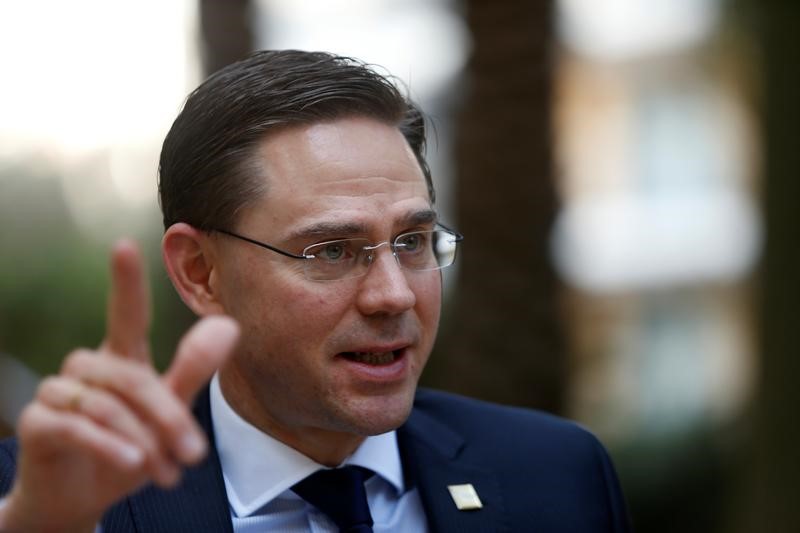By Robin Emmott
ST JULIAN'S, Malta (Reuters) - The next steps in euro zone integration after Brexit could include greater investment in poorer members of the currency area, but only if they reduce the risky links between governments and banks, a top EU official said.
Britain's pending departure from the European Union has reignited the debate on how to reinvigorate the bloc and make the euro zone stronger and more sustainable, despite different views held by France and Germany.
European Commission Vice President Jyrki Katainen said his political family, the powerful European People's Party (EPP) that includes German Chancellor Angela Merkel, was ready to consider funding investment to weak members of the euro zone.
That falls well short of long-held French demands, quashed by Germany, to coordinate economic policy across the euro zone and preside over fiscal transfers between its 19 members.
But the centre-right EPP, whose lawmakers hold the most seats in the European Parliament, is more open to what Katainen called an "investment capacity", potentially backing projects through the EU's new infrastructure investment fund via the European Investment Bank.
"It's understandable that in economics there are cycles and in order to keep a currency union as stable as possible, there's a need to level the peaks and troughs," Katainen told Reuters an interview on Friday after an EPP congress in Malta.
"If there are shocks in some members that are cyclical in nature, it makes sense to help," he said.
Following the euro zone's near break-up during the 2010-2012 crisis, many economists argued the currency area could only survive as a proper monetary union like the United States.
That would mean a new European economic governance, possibly with a euro finance minister who has the means to make fiscal transfers from richer to poorer euro zone states.
The idea has been anathema to Germany's ruling class, with Merkel's government having rejected any form of permanent transfers to poorer countries, fearing Berlin would have to foot the bill and would lose control of reckless spenders.
But Katainen, a former Finnish prime minister whose country was among those who allied with Germany on the issue during the crisis, said he sensed a change in northern politicians.
"I see more willingness to consider what the ideal currency union would look like," said Katainen. "My own thinking has also changed. It doesn't cost anything to be open minded."
While Britain is not a member of the euro zone, its decision to trigger exit proceedings from the EU on Wednesday has left officials looking for ways to keep European integration alive.
"NO TRUST"
The European Commission, the EU executive, is expected to come forward with a so-called reflection paper on deepening euro zone integration in May, although Katainen is not involved in that work. He said he spoke only for the EPP on the matter.
"Because of Brexit, the sentiment of the remaining 27 countries on reforming the EU has strengthened, with a focus on EMU," Katainen said, referring to Economic and Monetary Union.
The euro zone, the economic core of the 60-year-old European project, tightened fiscal rules and created its own rescue fund and a common supervisor for banks during the heat of the crisis but is still considered by many as incomplete.
However, Katainen cautioned that the biggest obstacle was the lack of trust between members of the euro zone. "We don't trust each other as much as we should."
One step proposed by the EPP is for the euro zone to establish limits on the amount of money governments can borrow from euro zone banks to avoid crises that would wipe out lenders if a country defaulted.
Domestic debt in the euro zone averaged almost 120 percent of banks own funds at the end of 2013, according to the EPP.
For banks, EU rules that consider sovereign debt as having a zero-risk weighting on balance sheets are a problem, Katainen said because bonds issued by euro zone governments are considered risk-free by their bankers.

"This is a viscous circle that must be broken. We must be ready to defend countries but we must also address the root causes of any crisis," he said.